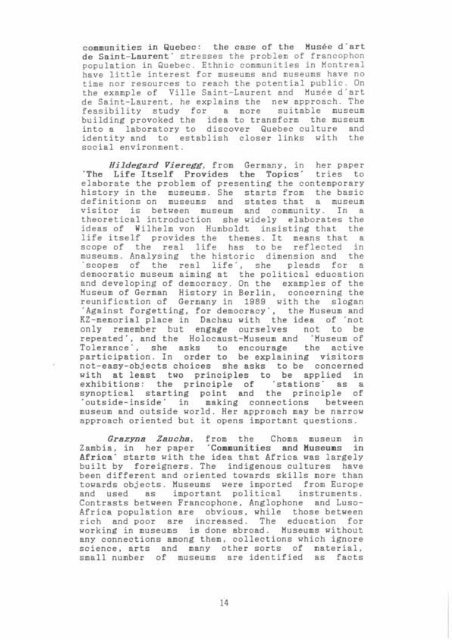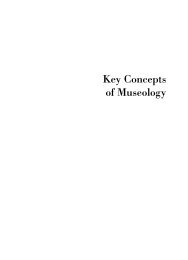ISS 25 (1995).pdf - The International Council of Museums
ISS 25 (1995).pdf - The International Council of Museums
ISS 25 (1995).pdf - The International Council of Museums
You also want an ePaper? Increase the reach of your titles
YUMPU automatically turns print PDFs into web optimized ePapers that Google loves.
communities in Quebec: the case <strong>of</strong> the Musee d'art<br />
de Saint-Laurent' stresses the problem <strong>of</strong> francophon<br />
population in Quebec , Ethnic communities in Montreal<br />
have little interest for museums and museums have no<br />
time nor resources to reach the potential public , On<br />
the example <strong>of</strong> Ville Saint-Laurent and Musee d ' art<br />
de Saint-Laurent , he explains the new approach , <strong>The</strong><br />
feasibility study for a more suitable museum<br />
building provoked the idea to transform the museum<br />
into a laboratory to discover Quebec culture and<br />
identity and to establish closer links with the<br />
social environment,<br />
Hildegard Vieregg, from Germany, in her paper<br />
'<strong>The</strong> Life Itself Provides the Topics' tries to<br />
elaborate the problem <strong>of</strong> presenting the contemporary<br />
history in the museums. She starts from the basic<br />
definitions on museums and states that a museum<br />
visitor is between museum and community. In a<br />
theoretical introduction she widely elaborates the<br />
ideas <strong>of</strong> Wilhelm von Humboldt insisting that the<br />
life itself provides the themes, It means that a<br />
scope <strong>of</strong> the real life has to be reflected in<br />
museums. Analysing the historic dimension and the<br />
scopes <strong>of</strong> the real life', she pleads for a<br />
democratic museum aiming at the political education<br />
and developing <strong>of</strong> democracy. On the examples <strong>of</strong> the<br />
Museum <strong>of</strong> German History in Berlin, concerning the<br />
reunification <strong>of</strong> Germany in 1989 with the slogan<br />
'Against forgetting, for democracy', the Museum and<br />
KZ-memorial place in Dachau with the idea <strong>of</strong> 'not<br />
only remember but engage ourselves not to be<br />
repeated', and the Holocaust-Museum and 'Museum <strong>of</strong><br />
Tolerance', she asks to encourage the active<br />
participation. In order to be explaining visitors<br />
not-easy-objects choices she asks to be concerned<br />
with at least two principles to be applied in<br />
exhibitions: the principle <strong>of</strong> 'stations' as a<br />
synoptical starting point and the principle <strong>of</strong><br />
'outside-inside' in making connections between<br />
museum and outside world. Her approach may be narrow<br />
approach oriented but it opens important questions.<br />
Grazyna Zaucha, from the Choma museum in<br />
Zambia, in her paper 'Communities and <strong>Museums</strong> in<br />
Africa' starts with the idea that Africa was largely<br />
built by foreigners . <strong>The</strong> indigenous cultures have<br />
been different and oriented towards skills more than<br />
towards objects. <strong>Museums</strong> were imported from Europe<br />
and used as important political instruments,<br />
Contrasts between Francophone, Anglophone and Luso<br />
Africa population are obvious, while those between<br />
rich and poor are increased. <strong>The</strong> education for<br />
working in museums is done abroad. <strong>Museums</strong> without<br />
any connections among them, collections which ignore<br />
science, arts and many other sorts <strong>of</strong> material,<br />
small number <strong>of</strong> museums are identified as facts<br />
14
















